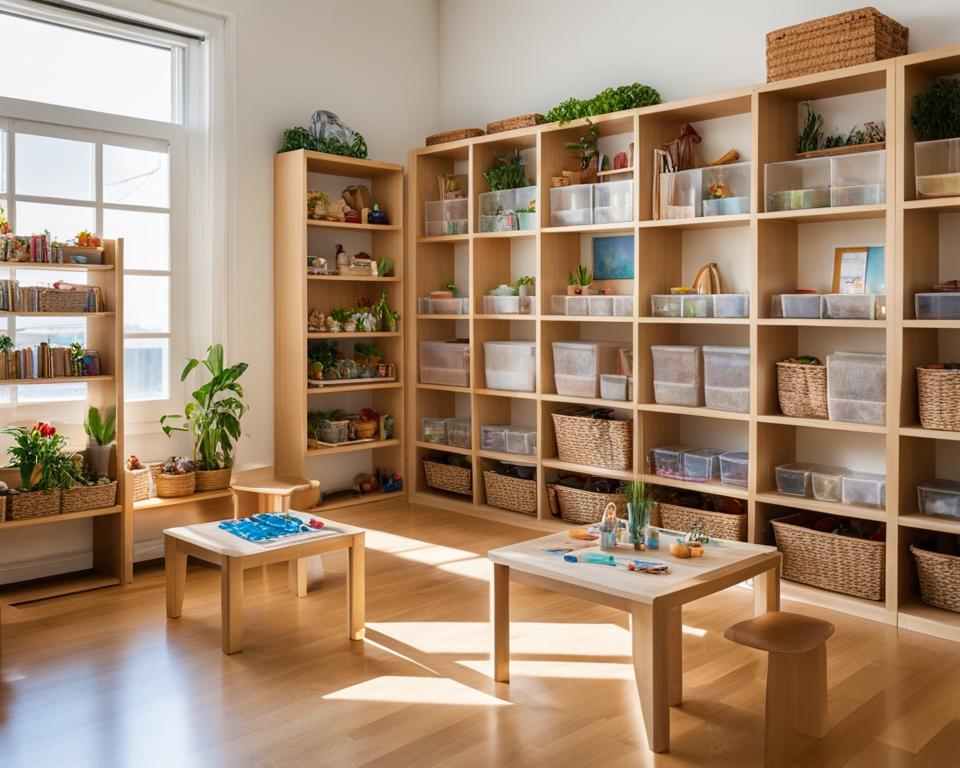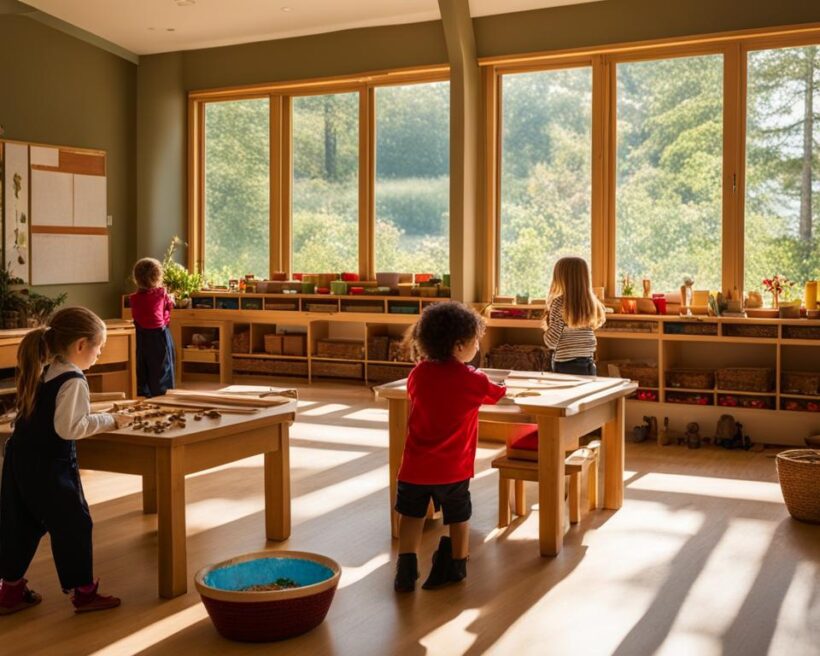Are you passionate about providing quality education and want to make a difference in the lives of young learners? Opening a Montessori school could be the perfect way to turn your dream into reality. Montessori education is known for its child-centered approach and emphasis on independence and self-directed learning.
With over 5,000 Montessori schools in the United States alone, the demand for this innovative educational model is steadily growing. If you’re ready to embark on the journey of starting your own Montessori school, there are several key areas to consider.
In this article, I will guide you through the essential steps of starting a Montessori school, from defining your mission, vision, and values to finding your niche in the education market. We’ll also explore the importance of creating a supportive school community, selecting the right physical space and materials, and understanding the financial and legal aspects of launching a Montessori program.
To get started on your Montessori school journey, follow the sections below. Each section will provide valuable insights, tips, and strategies to help you build a successful Montessori school:
Mission, Vision, & Values
Creating a strong foundation for your Montessori school begins with clearly defining your mission, vision, and values. These statements will serve as guiding principles that shape your school’s culture and educational approach. We’ll explore how to craft compelling mission and vision statements that resonate with your target audience and reflect the core values of Montessori education.
Your School Community
A thriving school community is vital for the success of your Montessori school. This section will delve into the importance of hiring qualified Montessori teachers, implementing effective student recruitment strategies, and fostering meaningful relationships with parents and caregivers. By building a supportive and engaged school community, you’ll create an environment where each child can thrive.
Physical Space & Materials
The physical environment of your Montessori school is crucial in facilitating a child’s learning and development. We’ll discuss how to select the ideal location, design inviting classrooms, and curate Montessori materials that align with the principles of hands-on, experiential learning.
Finding Your Niche
To stand out in the competitive education landscape, it’s essential to identify and cater to the unique needs of your community. This section will guide you through conducting a community assessment, selecting the appropriate Montessori program levels, and offering specialized programming that sets your school apart.
Finances & Legal Matters
Starting a Montessori school involves financial planning and understanding the legal requirements. We’ll explore how to develop a comprehensive budget, secure funding, and navigate the licensing and regulatory processes. Seeking legal counsel will ensure that you comply with all necessary guidelines and safeguard the future of your Montessori school.
Embarking on the journey to start a Montessori school requires dedication, passion, and careful planning. By taking these vital steps and embracing the Montessori philosophy, you can create an educational institution that nurtures the growth and potential of each child.
Stay tuned for our upcoming sections, where we will provide detailed insights and strategies for each step on your path to opening a successful Montessori school.
Mission, Vision, & Values
Creating a strong mission, vision, and values for your Montessori school is imperative in establishing a solid foundation for success. These elements serve as guiding principles that define your school’s purpose, aspirations, and culture. Crafted thoughtfully, they not only communicate your school’s identity but also resonate with parents, students, and the wider community.
Let’s explore the importance of each of these components:
Mission Statement
A Montessori school mission statement articulates the reason behind your school’s existence. It concisely summarizes what your school aims to achieve and how it plans to accomplish its goals. A well-crafted mission statement conveys the essence of the Montessori education philosophy and exemplifies your school’s commitment to fostering a love of learning, independence, and respect for others. It should capture the unique qualities that set your school apart in the Montessori landscape.
Vision Statement
In contrast to the mission statement, a Montessori school vision statement focuses on the future and paints an ideal picture of what your school aspires to become. It expresses your school’s long-term goals, aspirations, and dreams. Crafting a compelling vision statement is an opportunity to inspire and challenge your school community to strive for excellence, innovation, and growth. It should reflect the values and principles engrained in the Montessori philosophy, projecting a vision of empowered learners, compassionate individuals, and responsible global citizens.
Values
Values form the moral compass of your Montessori school. They define the core principles and beliefs that guide the behavior, decisions, and interactions within your school community. Articulating your school’s values is crucial for creating a culture of inclusivity, respect, and integrity. It sets expectations for students, staff, and parents alike, fostering a sense of belonging and shared responsibility. Your school’s values should resonate with the wider Montessori philosophy, emphasizing compassion, collaboration, and the holistic development of each child.
Your School Community
When starting a Montessori school, one of the key considerations is staffing. Hiring teachers who hold Montessori teaching credentials is essential for providing a high-quality education. These credentials demonstrate a deep understanding of the Montessori philosophy and methodology, ensuring that your staff is well-equipped to meet the unique needs of Montessori students.
Montessori school staffing should prioritize individuals who are not only qualified but also passionate about the Montessori approach. Look for educators who are dedicated to fostering a nurturing and student-centered learning environment. Conduct thorough interviews and reference checks to ensure compatibility and alignment with your school’s mission and values.
Additionally, student recruitment is a crucial aspect of establishing a successful Montessori school. Your goal is to attract prospective students who will thrive in a Montessori environment and contribute positively to your school community.
One effective strategy for Montessori school student recruitment is creating a professional website that showcases your school’s unique offerings and features captivating content. This website should include information about your Montessori curriculum, experienced staff, enriching extracurricular activities, and testimonials from satisfied parents.
Remember to optimize your website with relevant keywords, ensuring that it ranks well in search engine results when parents search for Montessori schools in your area. Moreover, make sure that your website is user-friendly and visually appealing to keep prospective parents engaged.
In addition to a website, hosting open houses can provide parents with the opportunity to visit your school, meet the staff, and get a firsthand experience of the Montessori learning environment. Open houses allow parents to ask questions, observe classrooms, and gain a deeper understanding of how Montessori education can benefit their child’s development.
Advertising through various channels can also help increase awareness of your Montessori school. Consider placing advertisements in local newspapers, parenting magazines, and online platforms frequented by parents seeking educational options for their children. Utilize social media platforms to share informative and engaging content about your school and highlight its unique aspects.
By implementing these student recruitment strategies, you can attract families who embrace the Montessori philosophy and are actively seeking a nurturing and holistic educational experience for their children.

| Montessori School Staffing | Montessori School Student Recruitment |
|---|---|
| Hire teachers with Montessori teaching credentials | Create a professional website |
| Ensure compatibility with school mission and values | Optimize website with relevant keywords |
| Interview and reference checks | Host open houses |
| Recruit passionate educators | Advertise in local media and online platforms |
Physical Space & Materials
When starting a Montessori school, choosing the right physical space is crucial for creating an environment that supports the Montessori approach. Consider factors such as accessibility, outdoor space, and the potential for future expansion.
A Montessori school facility should provide ample space for classrooms, outdoor play areas, and common spaces for community gatherings. Accessibility is key, ensuring that the facility is easily reachable for both students and parents. Outdoor space is essential for allowing children to connect with nature and engage in hands-on learning experiences.
Montessori school classrooms should be safe, beautiful, and inviting. Each classroom should have distinct areas designated for different curricular areas, providing children with the freedom to explore and learn independently. The layout of the classrooms should facilitate movement and promote a sense of order and organization.

Montessori materials play a crucial role in the implementation of the Montessori approach. These materials are carefully designed to foster hands-on learning, promote concentration, and develop essential skills and concepts. They should be easily accessible and organized within the classroom, allowing children to independently select and work with materials that capture their interest.
Finding Your Niche
When starting a Montessori school, it is crucial to assess the community where you plan to open. Understanding the needs, wants, and resources of the families in the area is essential for creating a successful school. By conducting a thorough Montessori school community assessment, you can gather valuable insights that will help you tailor your program to meet the unique needs of your community.
One way to assess the community is by engaging with local parents and caregivers through surveys or focus groups. This will allow you to gather feedback on what they value most in a Montessori education, what challenges they face in their current education options, and what they would like to see in a new Montessori school.
Another important factor to consider is the existing education landscape in your area. Research the Montessori schools already operating in your community and identify any gaps or niches that you can fill. For example, if there are no Montessori schools offering programs for infants and toddlers, you may want to consider specializing in that age group.
Evaluating Program Options
After conducting your Montessori school community assessment, you can use the insights you’ve gathered to inform your program selection. It is crucial to offer programs that align with the needs and interests of your community while staying true to the Montessori philosophy.
Consider the following factors when selecting Montessori program levels:
- The age range of children in your community
- The demand for specific program levels
- Your capacity to provide quality education for each level
Your goal is to create a comprehensive Montessori school program that addresses the developmental needs of children in your community from infancy to adolescence. This will ensure that families have continuity of education within your school and that you meet the diverse needs of your community.
Here’s a table summarizing the different Montessori program levels:
| Program Level | Age Range | Description |
|---|---|---|
| Infant & Toddler | Birth to 3 years | Focuses on nurturing independence, language development, and motor skills. |
| Primary | 3 to 6 years | Emphasizes practical life skills, sensorial exploration, and introduction to academic concepts. |
| Elementary | 6 to 12 years | Expands on academic concepts, encourages inquiry and exploration, and fosters a sense of community. |
| Adolescent | 12 to 18 years | Focuses on real-world experiences, independent research, and community engagement. |
By selecting the right Montessori program level(s) and offering unique programming that suits the specific needs of your community, you can differentiate your school and attract families who resonate with your approach.
Finances & Legal Matters
When starting a Montessori school, it is crucial to carefully plan your finances. Developing a detailed budget is essential to ensure you cover all necessary expenses. Consider costs such as property purchase or rental, construction or renovation, furnishings, and staff salaries. Creating a comprehensive budget will help you manage your finances effectively and ensure the long-term sustainability of your school.
In addition to financial planning, understanding the legal requirements for running a Montessori school is equally important. You will need to navigate licensing procedures, regulations, and contracts. Ensuring compliance with these legal requirements is crucial for creating a safe and reputable learning environment for your students. It is highly recommended to seek legal counsel to ensure you fully understand and meet these obligations.
By carefully managing your finances and complying with legal requirements, you can establish a solid foundation for your Montessori school. This will enable you to focus on delivering the high-quality education and holistic development that Montessori education is known for, while providing a safe and nurturing environment for your students to thrive.
FAQs on How To Start A Montessori School
-
How do I create a mission and vision for my Montessori school?
Creating a mission and vision statement is an important first step for your Montessori school. The mission statement explains why your school does what it does, while the vision statement is aspirational.
-
What should I consider when staffing my Montessori school?
When staffing your Montessori school, it is important to hire teachers who hold Montessori teaching credentials. This ensures the quality of education your school will offer.
-
How can I attract prospective students to my Montessori school?
You can attract prospective students to your Montessori school by creating a website, holding open houses, and advertising. These strategies help increase awareness and generate interest among families.
-
What factors should I consider when choosing a physical space for my Montessori school?
When choosing a physical space for your Montessori school, consider factors such as accessibility, outdoor space, and potential for future expansion. Montessori classrooms should be safe, beautiful, and inviting.
-
How can I assess the needs of the community where I plan to open my Montessori school?
To assess the needs of the community, interact with families, conduct surveys, and research local demographics. This understanding will help you select the right Montessori program level(s) and offer unique programming that suits the community’s needs.
- How should I plan the finances for my Montessori school?
When planning the finances for your Montessori school, develop a detailed budget that takes into account expenses such as property purchase or rental, construction, furnishings, and staff salaries. This will help ensure financial stability.
-
What are the legal requirements for running a Montessori school?
The legal requirements for running a Montessori school include licensing, regulations, and contracts. It is essential to seek legal counsel to ensure compliance and avoid any legal issues.
Read Next:








